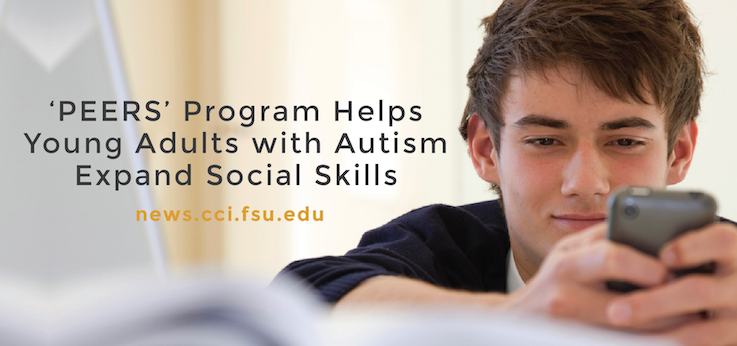
In it’s third semester, PEERS (Program for Evaluation and Enrichment of Relational Skills), is becoming an invaluable piece of the Tallahassee community. The School of Communication Science & Disorders at Florida State University is partnering with the Center for Autism & Related Disabilities (CARD) to use evidence-based research to impact the lives of middle and high school students on the autism spectrum.
PEERS is a social skills training program, built on research from UCLA and can be applied to a community’s unique needs. The program, which started in Fall 2014, aims to help motivated teenagers learn ways to make and keep friends. While students attend sessions that build and strengthen social skills, parents attend separate sessions that teach ways to assist their children in expanding their social networks. Parents can then help practice new skills with their kids.
Teaching faculty members Susan Brosnan-Maddox and Jarrod Zinser lead the initiative from Communication Science & Disorders. Graduate students participate in sessions and earn practicum hours while gaining experience with group therapy. The Master’s program at FSU requires 400 practicum hours across nine learning areas.
The Fall 2015 class has fourteen students ranging from 7th to 9th grade. During the 14 week course, students learn skills that will help in social situations. Each week focuses on a different situations, varying from ‘trading information’ to hosting a get-together. Four FSU graduate students are paired up with kids and work through lessons.
Held in the Fall and Spring, PEERS has done courses with students in 7th-9th grade, as well as 10th-12th grade. Brosnan-Maddox says the transition into middle school can be particularly tough for kids on the autism spectrum, as social interactions are increasingly important. During PEERS sessions, teens work through these situations by roleplaying with practice scripts and get comfortable with the idea of approaching a new friend.
Barriers from bullying can make kids hesitant, but Zinser says over time the kids warm up to the idea of approaching others. PEERS gives kids skills to gauge acceptance, recognize subtleties in conversation and transition into the overwhelming world of being a teenager in the modern world.
Now in it’s third class, Zinser and Brosnan-Maddox are happy to report that PEERS sessions are working. Students have been able to establish new friendships and flourish with their new skills. Brosnan-Maddox started working with children on the spectrum in 1998 and is seeing the children she diagnosed through early intervention come through the PEERS program.
Those interested in the PEERS program should contact Tammy Dasher or Lerena Fleck, CARD Consultants. The Center for Autism and Related Disabilities frequently updates opportunities on their Facebook page as well.
CARD is dedicated to providing individuals with autism or related disabilities, their families, and professionals who work with them, free consultation, resources, and educational support to build knowledge, confidence, infrastructure, and sustainability within the community. There are three FSU CARD centers across the state, located in Tallahassee, Panama City and Pensacola. The Tallahassee branch offers training and services to the entire Florida Panhandle.

